Beyond the Aesthetics: The Role of the Body Weight

Many people equate weight loss with a symbol of beauty and health.
Because we do not fully understand the role of body weight and its functionality, we often treat our weight as an enemy, and we strive to maintain precisely the same weight we had when we were eighteen. However, weight plays a significant positive role as a buffer in our body, just as it does in the animal world.
Here are some of the body weight functions:
1. Accommodate seasons and life cycle changes. In winter, we are supposed to gain weight to better regulate our body temperature and counteract a nutrient deficiency in our food. In ancient times, in the majority of cultures, women typically wore belts and loose clothing, which allowed for seasonal fluctuations in body weight, as they would gain and lose 5-20 pounds annually. Then there were pregnancy and breastfeeding clothes, which were loose on the sides. Modern clothing often fails to accommodate potential weight fluctuations. They are tight, often restricting your circulation, and every time you gain a few pounds, you need to change them.
2. Adjust your body size, based on the type of work you do. People who primarily work physically or engage in heavy weightlifting will naturally develop larger muscles and a wider body frame. If you start working out in the gym and use heavy weights, your weight will increase or stay the same (despite your efforts to lose it). It is absolutely normal and healthy, because your bone and muscle density will increase. The latter will help you reduce the risk of muscle injuries and avoid osteoporosis as you age. When you engage in strength training, you build a reservoir of power and strength for the future, as the body loses its ability to create new muscle and bone after a certain age.
3. Change with age. Age naturally affects your body weight. Despite the perception that one should maintain the same weight throughout their lifetime, their figure naturally changes over the years, and this is completely normal.
4. To help you adapt to increasing life and work responsibilities. As you become an adult, you assume greater social responsibility and encounter more life challenges. As a result, your body needs a higher physical and energetic mass to handle those. Your bones, which serve as your energetic reservoirs, typically become stronger and larger to meet the increasing demands of heavier emotional and physical loads. There are some exceptions, but typically, people who are slim tend to get tired more easily and are less resilient emotionally. As you may know, many singers lose the strength of their voice when they lose too much weight. But this is relevant not only to signing. You need sufficient physical and energetic mass to be able to handle what’s on your plate.
5. Balance emotional insecurity. If you do not feel safe emotionally, your body builds an external fortress for your soul. If you are constantly exposed to high stress and have difficulty coping with it, or have just undergone a severe trauma, it may impact your body weight by either weight loss or weight gain. Gaining weight is your body’s way of protecting your heart through the physical body.
It is much more difficult for a body to handle physical and emotional stresses when it is low on nutritional resources and does not have a physical buffer where negative emotions can be stored safely until they can be released. We can recall here the well-known phrase “tissues hide issues,” and the science of psychoomatic therapy that has proven that trauma can be released through the body. Another example of how emotions can affect your body is painful menses and PMS. During the PMS, accumulated negative emotions are released, both physically and emotionally. During the “moon days”, a woman can become crabby and crampy.
6. Represent Genetic Make-up.
Your genetic predisposition has a significant influence on your body type. The lifestyle and background of your immediate family and your ancestors will significantly predetermine your body shape.
Summary: Our weight is not a random number. Our body is an adaptation mechanism that helps us handle various life circumstances and function in various conditions.
Body Energetics and Weight

For example, if you are accustomed to overcoming life challenges and possess good life skills, you will experience less anxiety and fear. As a result, you will not have a large load of negative emotions to store in your body and will not tend to binge when under stress. Then it will be easy for your body to maintain a healthy weight range. Provided you have a more or less quality diet and exercise routine, of course.
However, on approximately the same diet, if you constantly worry and are afraid to deal with various life situations, you will be accumulating a lot of negative emotions in your body. When you get stressed, you’ll eat more and more frequently, which will lead to maintaining the extra weight, despite your efforts to eat healthily when you feel good. One of the functions of your body weight is to act as a protective shield and a storage for your emotions.
Your body’s weight distribution is very significant. Depending on which part you store the most emotions (your own and those of people you interact with), this is typically where your weight will tend to accumulate. For example, for women, it is frequently the hip or breast area. This is where are located our heart, sacral and base chakras, and women use them a lot in their interaction with the external world.

The Heart Chakra (Anahata) is connected to nurturing others and feeling nurtured. If you have a lot of stressful interactions related to others or fears about communicating with someone, or you have been a caregiver, you may start gaining weight in the breast area.
The Sacred Chakra (Svandhistana) is connected to our ability to connect with others and sexuality.
The Base Chakra (Muladhara) is our sense of security and safety. There is often a strong connection between excess weight in the lower body and feelings of insecurity.
Most men (and some women) gain weight in the predominantly abdominal area, where the Solar Plexus Chakra (Manipura) is located. This chakra helps us to make day-to-day decisions, take risks and is connected to our leadership skills and financial success. People who are driven will often have fat in the abdominal area, which also means that their solar plexus chakra and life skills required for handling their responsibilities are not strong enough for what they need to do.
Why Do People Gain the Weight Back

The reason why most people go through “lose-gain” cycles is because you cannot fool your body. It knows precisely how much weight it needs for the buffer and where it needs to store it, to compensate for the lack of emotional resilience. The body will “make you” eat, to restore its own “homeostasis”, which may not be what you want it to do, but what it is used to do to handle the life challenges. Only people with strong willpower can control their bodies 100% of the time, but it requires a great deal of effort.
The solution to this fight with yourself isn’t dieting. What you need to do is to work with your traumas and fears, as well as to increase your life skills, work on overcoming your personal weaknesses and creation of a solid life plan. First, you need to create stability in your life and environment, and then to work on your body. When you feel emotionally more “together” and safe, when you have more steady rhythm of life and daily routine, it will be much easier to correct your body weight. Before these changes take place, your body needs “cushion” for handling the life challenges you are struggling with.
Yes, you will need to make changes in your diet and get on a quality exercise routine (you cannot live on pizza and sit on a couch all day and expect to be fit). However, if you try to correct your weight without working on your core inner strength and emotional resiliency (=energetic mass), the results will be very temporal and you will continue the yo-yo pattern. Or you will exhaust your body trying to get rid of extra pounds, which will deplete your resources, just to found that you lost motivation and enthusiasm to maintain the strict routines you created.
Key Thoughts

Body weight fluctuations in different stages of life and seasons are normal and should not be considered a “disorder” to be “treated.” Do not buy into “one for all” body size and weight. They do not exist. You have the body you have because of your current individual needs and because of what you’ve been doing with this body many lives prior (your body is an accumulative energetic imprint from the previous lives).
Your body weight and shape represent your current energetic state, which is determined by your physical and mental activity, genetic make-up, current physical and emotional challenges, and your ability to handle life, depending on the acquired life skills.
Your body serves you best under the current circumstances. You may need a higher physical and energetic body mass than you think to handle your life, and it may be your positive leverage (just like it is for a professional singer).
Trying to achieve a specific weight or inch measurement through stimulation may have a negative impact on your health and typically has a temporary effect. Instead of focusing on the “ideal body,” it is essential to prioritize building your physical and emotional health and resilience. When your energetic mass becomes high (i.e., you become more resilient to life’s challenges), your body mass will start diminishing, because it will no longer be needed to support you during times of stress. When your spirit and will-power grow strong, they will be able to keep the “mind over matter.”
When you work from the inside out, your body weight and even shape may change gradually. It is a very slow process and may take more than one life. Therefore, the first step is self-acceptance and appreciation of the body you have. You need to stop judging yourself by your weight. You are a beautiful living soul that neither gains nor loses weight, and that does not grow old (unless you choose it).


